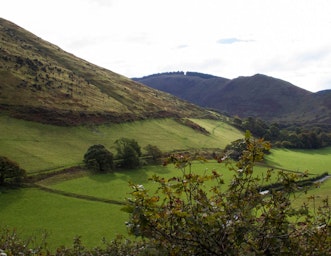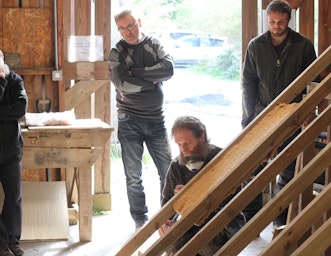
Paul Allen made sure to attend some of the many civil society events happening in Glasgow outside the official COP26 arena. In particular, the People’s Summit, organised by the COP26 Coalition, brought the climate justice movement together to discuss, learn from one another, and push for systemic change. He shares his experiences here.
Yesterday was the final day of the COP26 Coalition’s ‘People’s Summit’, and many thanks to everyone who has been involved and helped organise the four-day programme of events! As well as helping press for increased ambition around climate justice in the negotiations, this summit has brought together and enabled NGOs, trade unions, grassroots community campaigns, faith groups, youth groups, migrant and racial justice networks to share ideas and solutions and accelerate the growing hive-mind of global expertise.
There is increasing concern at COP26 that the changes needed to achieve 1.5C will not by delivered by world leaders. So even though it is, of course, important to share solutions and be an official observer in the Blue Zone, I made sure I allocated time to attend a selection of People’s Summit events, to share our Zero Carbon Britain research and help inform future work.
Black Black Oil
My first summit event was a showing of the ground-breaking film ‘Black Black Oil’ in the Glasgow Film Theatre. The film uses the UK’s entanglement with North Sea oil to explore the complexities of transitioning away from oil and gas as a society and considers how quickly we can do it as we hurtle towards a Climate Emergency. This was followed by a very moving panel discussion including film maker Emma Davie, researcher Terry Macalister, plus leading Climate expert Kevin Anderson who appears in the film. They talked about how they managed to get the film made and available for all via BBC i-player, and the detailed research which underpins it.

Energy Transition – Deciding our Future
My next summit event ‘Energy Transition – Deciding our Future’ was a very moving experience, not least in revealing how the current and historic exploitation of indigenous people and their land has helped lead Canada into a very challenging position today. My role was to present how CAT developed our Zero Carbon Britain research, and how a detailed national scenario can be used to enable thinking across disciplines and build momentum around a positive, evidence-based vision of the future.
COP26 House
My third external event was an invitation to explore the ‘COP26 House’ at the Landing Hub, a site owned by Scottish Enterprise, in the city centre by the Clyde. I was invited by the designer of the ‘COP26 House’, Peter Smith, of Roderick James Architects, and Beyond Zero Homes. I was very impressed and immediately felt I could happily live there! The ‘COP26 House’ is open to everyone throughout the 2 weeks of COP26 and showcases what we can achieve with the materials and technologies we already have available today.
The house brings to life a simple, affordable way to build attractive homes which simultaneously help us deliver on our climate commitments. Every detail in the design of the COP26 House had been considered in terms of its environmental and social impact, the performance in use, capacity for re-use of materials at end of life, and – importantly – affordability. The COP26 house included features such as a mechanical ventilation heat recovery system, wood fibre insulation, and recyclable, high-efficiency heating panels. Once COP26 finishes the house will be dismantled and reassembled near Aviemore, part of a new development of 12 affordable timber houses.

It was also personally very moving for me to get the invitation from by Roderick James Architects, as Rod was the first director of the Centre for Alternative Technology in Machynlleth, Wales, from its start in 1973 and for the following seven years. He was in the role when I first volunteered at CAT in 1979. See https://www.beyondzerohomes.co.uk
You can make a virtual tour of the house via https://www.beyondzerohomes.co.uk/virtual-tour-of-cop26house/
So, as the Peoples Summit draws to a close, I would like to offer my deepest thanks to everyone who has worked hard to deliver the amazing and diverse programme of events, it has been amazing. In addition to pressing for increased ambition in the negotiations, we must also imagine and build a future that works for all of us. The transformative solutions that we need to survive and build a more just and fair world can be brought about through solidarity, and coordination, backed by investment in collective action and adaptive processes for local communities and at an international level.
About the Author
Paul Allen is knowledge and outreach coordinator for CAT’s Zero Carbon Britain. Offering 30 years’ experience initiating ‘ahead of the curve’ research projects, backed by strong technical and practical experience, Paul has led the ground-breaking Zero Carbon Britain research for over 12 years, leading on the development of six reports and liaising directly with government, business, public sector and the arts to share their findings. He has a wide breadth of public speaking experience from UNFCCC COP conferences to local council training.
- Zero Carbon Britain
- Climate Change
Related Topics
Related Pages
Related news


CAT Conversations: Sandy Stevens, CAT graduate
17th April 2025
CAT stories – Nick Parsons and Mike Russell
29th January 2025
‘The finance COP’
29th November 2024EMAIL SIGN UP
Keep up to date with all the latest activities, events and online resources by signing up to our emails and following us on social media. And if you'd like to get involved and support our work, we'd love to welcome you as a CAT member.
